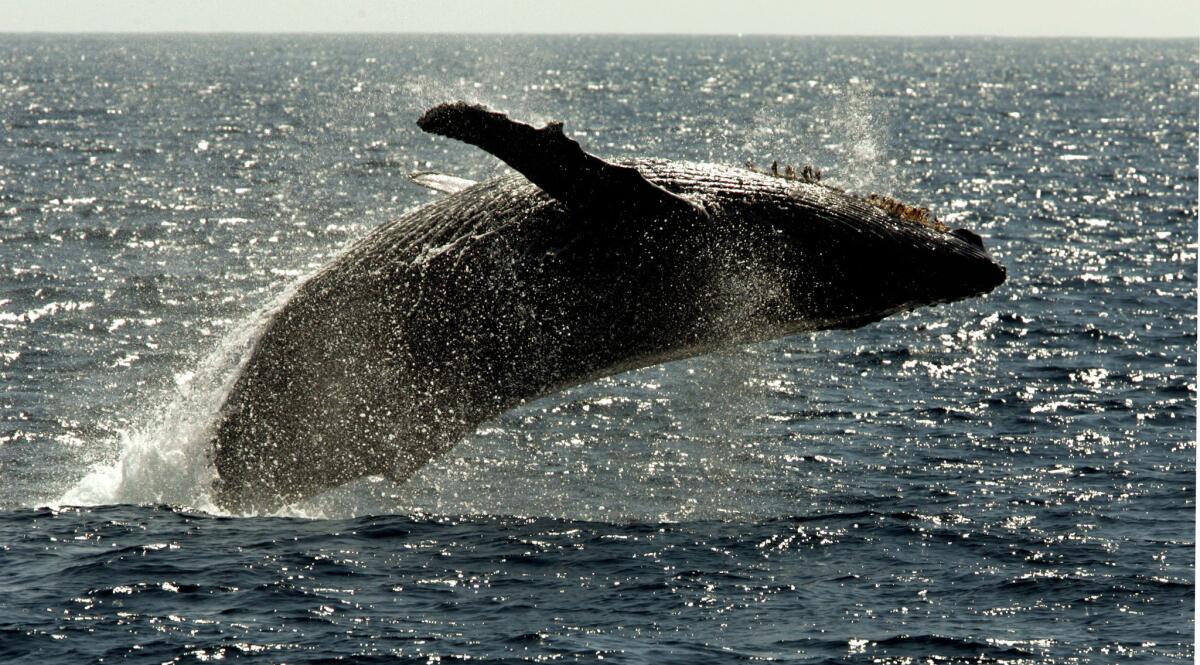Feds approve Navy’s sonar training; environmentalists sue over whales

- Share via
The Navy’s five year-plan to use sonar in training exercises off Southern California and Hawaii was approved Monday by the National Oceanic and Atmospheric Administration.
But several environmental groups, represented by San Francisco-based Earthjustice and anticipating the approval, immediately filed a lawsuit in Hawaii federal court to block the training on grounds that the underwater noise poses an unacceptable threat to marine mammals.
NOAA, after a review by its fisheries division, concluded that the promised mitigation measures by the Navy will “minimize effects on marine mammals.”
FOR THE RECORD:
Navy sonar training: In the Dec. 17 LATExtra section, an article about the Navy obtaining approval to use sonar in training exercises off Southern California and Hawaii included an incorrect byline. The article was written by Times staff writer Tony Perry, not Tony Barboza. —
The Navy insists that the sonar training is crucial to prepare sailors to detect the super-quiet submarines owned or being developed by adversaries such as Iran, particularly in shallow waters like the Persian Gulf.
Environmentalists assert that the training could be conducted in places without large numbers of whales and other mammals and by avoiding the use of sonar sending out loud noises that subject the mammals to hearing loss, lung injuries and death.
NOAA, in its decision, noted that the Navy has promised to shut down use of sonar and explosives if marine mammals are spotted “within designated mitigation zones.” The Navy has promised to designate a “humpback whale cautionary area” around Hawaii during winter months.
Also, NOAA’s approval requires the Navy and federal fisheries’ officials to meet annually to “discuss new science” and review whether additional mitigation measures are needed.
The environmental groups’ lawsuit asserts that the Navy’s measures are inadequate given the imperiled status of many of the species.
“Some of the marine mammals threatened by Navy activities are already on the brink of extinction, such as the Hawaiian monk seal, [which is] our state mammal and one of the world’s most endangered species,” said Marjorie Ziegler of the Conservation Council for Hawaii.
The dispute between the Navy and environmentalists over sonar’s impact on marine mammals has flared for several years. Much of the dispute has centered on different scientific evaluations about how many mammals are harmed.
The Navy estimates that its training off Hawaii and Southern California will kill 155 whales over the five years. The environmentalists say the number of those killed or crippled is much higher.
“The whales and dolphins who wind up in the middle of the war games don’t stand a chance against the Navy,’’ said Miyoko Sakashita, ocean director for the Center for Biological Diversity.
In March the California Coastal Commission sided with the environmentalists, voting unanimously to reject the Navy’s request for approval for increased use of sonar and explosives in training off Southern California.
In August, the Navy rejected the commission’s directive, saying it felt the mitigation measures were adequate.
The Natural Resources Defense Council responded by criticizing the Navy and saying that several new studies show that the Navy’s Southern California activities are harming marine mammal species, such as blue whales and beaked whales, “more than was previously known.”
ALSO:
Girl, 14, shot dead on her bicycle in Compton is identified
Andy Warhol painting of Farrah Fawcett: Jaclyn Smith weighs in
Sheriff’s officials taped threat to arrest FBI agent, prosecutor says
Twitter: @LATsandiego
tony.perry@latimes.com
More to Read
Sign up for Essential California
The most important California stories and recommendations in your inbox every morning.
You may occasionally receive promotional content from the Los Angeles Times.













